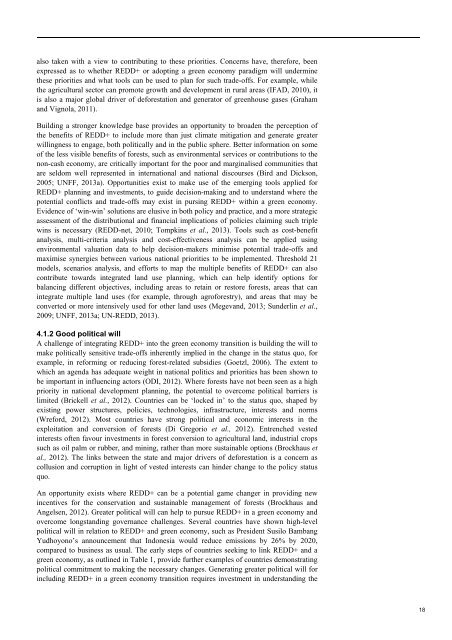integrate REDD+ into a green economy transition - Unredd.net
integrate REDD+ into a green economy transition - Unredd.net
integrate REDD+ into a green economy transition - Unredd.net
You also want an ePaper? Increase the reach of your titles
YUMPU automatically turns print PDFs into web optimized ePapers that Google loves.
also taken with a view to contributing to these priorities. Concerns have, therefore, been<br />
expressed as to whether <strong>REDD+</strong> or adopting a <strong>green</strong> <strong>economy</strong> paradigm will undermine<br />
these priorities and what tools can be used to plan for such trade-offs. For example, while<br />
the agricultural sector can promote growth and development in rural areas (IFAD, 2010), it<br />
is also a major global driver of deforestation and generator of <strong>green</strong>house gases (Graham<br />
and Vignola, 2011).<br />
Building a stronger knowledge base provides an opportunity to broaden the perception of<br />
the benefits of <strong>REDD+</strong> to include more than just climate mitigation and generate greater<br />
willingness to engage, both politically and in the public sphere. Better information on some<br />
of the less visible benefits of forests, such as environmental services or contributions to the<br />
non-cash <strong>economy</strong>, are critically important for the poor and marginalised communities that<br />
are seldom well represented in international and national discourses (Bird and Dickson,<br />
2005; UNFF, 2013a). Opportunities exist to make use of the emerging tools applied for<br />
<strong>REDD+</strong> planning and investments, to guide decision-making and to understand where the<br />
potential conflicts and trade-offs may exist in pursing <strong>REDD+</strong> within a <strong>green</strong> <strong>economy</strong>.<br />
Evidence of ‘win-win’ solutions are elusive in both policy and practice, and a more strategic<br />
assessment of the distributional and financial implications of policies claiming such triple<br />
wins is necessary (REDD-<strong>net</strong>, 2010; Tompkins et al., 2013). Tools such as cost-benefit<br />
analysis, multi-criteria analysis and cost-effectiveness analysis can be applied using<br />
environmental valuation data to help decision-makers minimise potential trade-offs and<br />
maximise synergies between various national priorities to be implemented. Threshold 21<br />
models, scenarios analysis, and efforts to map the multiple benefits of <strong>REDD+</strong> can also<br />
contribute towards <strong>integrate</strong>d land use planning, which can help identify options for<br />
balancing different objectives, including areas to retain or restore forests, areas that can<br />
<strong>integrate</strong> multiple land uses (for example, through agroforestry), and areas that may be<br />
converted or more intensively used for other land uses (Megevand, 2013; Sunderlin et al.,<br />
2009; UNFF, 2013a; UN-REDD, 2013).<br />
4.1.2 Good political will<br />
A challenge of integrating <strong>REDD+</strong> <strong>into</strong> the <strong>green</strong> <strong>economy</strong> <strong>transition</strong> is building the will to<br />
make politically sensitive trade-offs inherently implied in the change in the status quo, for<br />
example, in reforming or reducing forest-related subsidies (Goetzl, 2006). The extent to<br />
which an agenda has adequate weight in national politics and priorities has been shown to<br />
be important in influencing actors (ODI, 2012). Where forests have not been seen as a high<br />
priority in national development planning, the potential to overcome political barriers is<br />
limited (Brickell et al., 2012). Countries can be ‘locked in’ to the status quo, shaped by<br />
existing power structures, policies, technologies, infrastructure, interests and norms<br />
(Wreford, 2012). Most countries have strong political and economic interests in the<br />
exploitation and conversion of forests (Di Gregorio et al., 2012). Entrenched vested<br />
interests often favour investments in forest conversion to agricultural land, industrial crops<br />
such as oil palm or rubber, and mining, rather than more sustainable options (Brockhaus et<br />
al., 2012). The links between the state and major drivers of deforestation is a concern as<br />
collusion and corruption in light of vested interests can hinder change to the policy status<br />
quo.<br />
An opportunity exists where <strong>REDD+</strong> can be a potential game changer in providing new<br />
incentives for the conservation and sustainable management of forests (Brockhaus and<br />
Angelsen, 2012). Greater political will can help to pursue <strong>REDD+</strong> in a <strong>green</strong> <strong>economy</strong> and<br />
overcome longstanding governance challenges. Several countries have shown high-level<br />
political will in relation to <strong>REDD+</strong> and <strong>green</strong> <strong>economy</strong>, such as President Susilo Bambang<br />
Yudhoyono’s announcement that Indonesia would reduce emissions by 26% by 2020,<br />
compared to business as usual. The early steps of countries seeking to link <strong>REDD+</strong> and a<br />
<strong>green</strong> <strong>economy</strong>, as outlined in Table 1, provide further examples of countries demonstrating<br />
political commitment to making the necessary changes. Generating greater political will for<br />
including <strong>REDD+</strong> in a <strong>green</strong> <strong>economy</strong> <strong>transition</strong> requires investment in understanding the<br />
18

















